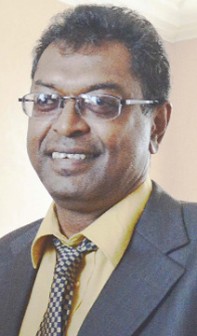While acknowledging that the laws and by extension the penalties for cannabis offences ought to be reviewed, Minister of Public Security Khemraj Ramjattan yesterday also argued that the current absence of a clear sentencing policy is a problem.
Ramjattan made these comments following continued public criticisms of the “harsh” sentences being handed down for possession of cannabis, including the recent high-profile case of football coach Vibert Butts.
Butts was last week sentenced to three years in jail after pleading guilty to having 46 grammes of cannabis in his possession for trafficking. According to the law, possession of any amount of cannabis over 15 grammes is considered trafficking, which is an offence that carries a minimum sentence of three years.

When asked for his views on the calls, including by the Rastafarian community, for repeal of the law governing the possession of cannabis, Ramjattan stated that all the laws, and especially the penalties, need to be reviewed.
A clear sentencing policy, he further said, needs to be worked out by the Chancellor and other members of the judiciary. An example, he said, would be to limit the penalty to a one-year maximum sentence.
He added that public opprobrium of the issue is being seen due to the absence of clear sentencing guidelines.
According to Ramjattan, magistrates and judges need to be conscious of public opinion and it is also important that the circumstances of a case be understood. He said that the entire debate is more of a sentencing matter than a need for the legislature to change the law.
Despite the doctrine of the separation of powers, he stated that there is need for communication so that the needs and views of the judiciary and legislature are known to each other. He added that while the sentences might not be unlawful, there might be injustices in their application, especially when “big traffickers are given minimal and suspended sentences.”
Butts, who was renowned for scoring Guyana’s first World Cup qualifier goal against Suriname in 1976, had repeatedly told the court during the hearing that he did not traffic drugs but that it was simply his way of life and part of his cultural practices.
Stabroek News was told that efforts are being made to draft an appeal on his behalf.
On Thursday, the members of the Rastafarian community staged a demonstration outside the Attorney General’s office to protest against what they described as the “unjust laws” against the possession of cannabis, which they want decriminalised.
Stabroek News made attempts throughout yesterday to contact Attorney General Basil Williams for a reaction but was told that he was in meetings.
While on the picket line, Ras Simeon, President of the Rastafari Council of Guyana, said that his religious rights through which the “holy herb” is utilised are being trampled upon.
He noted that during the elections campaign period, a lot of promises were thrown around but after the new government entered office no change has been sighted on the horizon.
In February this year, APNU General Secretary Joseph Harmon had said that an APNU government would review the decriminalisation of cannabis. This statement was made during a press conference, where he also said that APNU was committed to reviewing the law governing the use of the drug and the sentencing policies that are in place.
Harmon had noted that the coalition realised that many of the country’s young men are languishing in the prison system because they were caught with small amounts of the drug and a study needed to be undertaken to ascertain if this has been beneficial to the country’s development.
According to Simeon, the goal of the Rastafarian community is to ease the grip of the law on marijuana possession and consumption. He emphasised that while many Rastafarians and non-Rastafarians have been jailed because of the possession and use of cannabis, there is no link between the substance and violence.
In some parts of the world, marijuana has been decriminalised for personal use. Guyanese-born security specialist Dr Ivelaw Griffith had told this newspaper in an exclusive interview that he supports the “selective decriminalisation” of marijuana as part of the overall strategy for responding to the wider drug threat facing the Caribbean region.
He went on to say that countries in the region have long complained that it makes little sense to arrest for one marijuana cigarette, simply to spend hundreds of hours in the courts that are already overcrowded.
These comments were met with mixed reactions.
Former Attorney-General Anil Nandlall had said that in the context of renewed interest in the subject, the time was probably ripe for the beginning of a national conversation on the matter and for public consultations to be held.
In terms of the revision of the penalty for the possession of marijuana which currently obtains in our laws, he said, “again, this had been the subject of ongoing debate.” He reminded this newspaper of the changes that were made to the law to allow for persons with small quantities not to suffer imprisonment as a mandatory sanction as it was before.
President David Granger, who at the time was the leader of the opposition, had said that the APNU does not have a position on the issue and had not discussed it but he believed that attitudes towards marijuana and the enforcement of the law are creating more problems than they are solving.
He drew the nexus between the criminalisation of marijuana and a large prison population.
Granger added that in the Guyana context the issue had to undergo a study before any reasonable positions can be reached.





